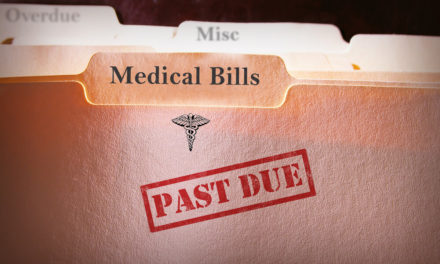We’ve all heard the phrase from Thomas Jefferson in the U.S. Declaration of Independence “that all men are created equal.”
It’s perhaps one of the most popular and important phrases of American history. While true, I am here to tell you that the IRS does not abide by Jefferson’s philosophy.
In the eyes of the IRS, “All income earned by men and women are not created equal.” Some income is not taxed at all, some is taxed at rates more than 37 percent, and most is taxed at rates between 10 percent and 37 percent.
The same source of income can be taxed at different rates depending on the tax circumstances of the recipient.
With careful planning and the new tax reform law, you can set yourself up to make more than $120,000 of income per year in retirement and pay zero dollars in taxes.
That’s more than $10,000 per month of income — tax free, and it’s completely legal.
These five combined strategies will help you achieve that goal, should you take on the challenge.
Before we get started, here are the facts of our fictional couple, but the results are very real!
- Married couple, ages 65
- Substantial savings in a taxable investment account
- Own primary residence
- Own rental property
- One spouse owns side business, makes $2,400 per month
Rental Property
Residential rental property is commonly treated favorably by the IRS for two primary reasons.
The first is the IRS allows taxpayers to deduct expenses related to the property directly against the rental income of the property.
The second is the IRS allows a non-cash depreciation deduction against the rental income.
Included in your taxable income is the net income from any rental property (rental income minus expenses). Depreciation is a complex accounting term but simply put, it means “deducting an asset over a period of time.”
For residential rental property, that time period is 27.5 years.
A residential rental property you paid $350,000 for would include a $12,727 additional expense every year (for 27.5 years) before you determine the amount that is included in taxable income.
Here’s how the math works on a hypothetical $350,000 residential rental property:
- Rental income equals $25,000
- Cash expenses at 50 percent of rental revenue equals $12,500
- Cash remaining equals $12,500
On the tax return, you would then deduct the $12,727 of depreciation expense, making your total expenses $25,227 ($12,727 plus $12,500).
Leaving you with a slight taxable loss on the property and adding nothing to your taxable income.
Tax-free earnings: $12,500.
Social Security in Retirement
The average annual Social Security check for 2017 was more than $16,000 for each individual collecting social security, and $32,000 for married couples.
To achieve a 0 percent income tax rate, the Social Security earnings will need to be slightly less for the year due to the nature of how Social Security income is taxed.
Your social security benefits may or may not be taxable based on the amount and source of the other income you receive during the year.
Combined annual social security benefits of $24,475 will be used for this scenario to achieve a 0 percent overall income tax rate.
You will never pay taxes on more than 85 percent of your Social Security income. If planned correctly with other sources of income, you may pay zero dollars in income taxes on your Social Security earnings.
Tax-free earnings: $24,475.
Dividend and Capital Gains Income
The IRS allows a 0 percent income tax rate for qualified dividends and capital gains on taxable income of $77,200, and less for a married couple filing a joint return.
Qualified dividends are most dividends paid from U.S. companies, and the stock is held for at least 60 days.
Be sure to check with your financial advisor to determine if your dividends are “qualified.”
To add to the benefit, the taxable income calculation to determine your 0 percent income tax bracket for qualified dividends and capital gains is after the standard deduction.
The standard deduction is $24,000 for married couples in 2018.
That means if qualified dividends and capital gains were your only source of revenue during the year, you could receive $101,200 and zero dollars in income taxes.
For the purposes of this example, we will use $79,000 of qualified dividend and capital gain income.
Tax-free earnings: $79,000.
Business Income
Taxes paid on income earned while you are in business are paid net of expenses. Meaning you deduct any expenses paid against the revenue you earn.
A portion of common expenses you would pay anyway can be allocated to business expenses, provided you have a business purpose for the expense.
For example, a retired engineer still wants to keep his mind fresh, so he provides consulting services to his old employer for five hours per month and charges $40 per hour of service.
The revenue earned from this during the year is $2,400. Without any taxes, the $2,400 would be included in income and most likely subject to additional self-employment taxes.
However, since it is business income, business expenses can be deducted against the income prior to determining the tax due on the income.
A portion of common expenses such as cell phone bills, internet bills, supplies, computers, home office expense can be claimed as a deduction against the income.
The key here is that the expenses deducted must have business purposes and not solely be personal in nature.
$2,400 of annual expenses is $200 of business expenses per month, which can be achieved easily by allocating a portion of the expenses listed above as business expenses.
If you can deduct the full $2,400 of business expenses, your net income from the business would be zero dollars ($2,400 minus $2,400), resulting in zero dollars in income taxes paid.
Tax-free earnings: $2,400.
Rent Your Primary House for 14 Days or Less
The IRS allows you to rent out your primary residence for a time period of 14 days or less during the year tax free.
Do you have a big event in town every year that visitors flock to looking for a place to stay? Live in a resort town? None of the above? No worries. With the onset of Airbnb and other vacation rental sites, it is now easier than ever to rent your house for short periods of time.
The rent collected during the time period as long as the total nights rented during the year is 14 days or less is income tax free.
However, you will not be able to deduct any expenses against the revenue since the IRS is already giving you a nice break.
Once you hit the 15-day mark, all rental income is subject to tax net of rental expenses.
As an example, a taxpayer who is able to rent out his house for an average of $300 per night during peak season times would earn $4,200 annually and pay the IRS zero dollars for that income.
Tax-free earnings: $4,200.
Summary
With these five strategies, you can earn $122,575 of income annually and pay zero dollars of income taxes!
Each individual’s tax situation is unique, but this is a great example of how you can keep more of your hard-earned money in retirement by allocating your assets in a tax efficient manner.




